江西省南昌市2017届高三英语第四次联考试题(含答案)
- 格式:doc
- 大小:165.34 KB
- 文档页数:12
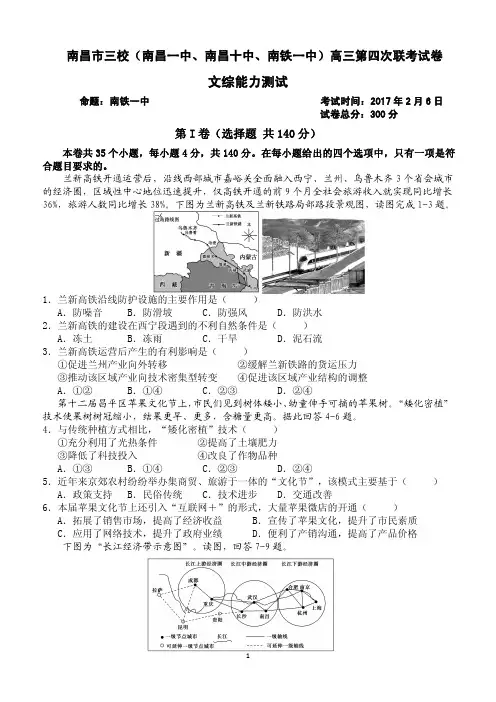
南昌市三校(南昌一中、南昌十中、南铁一中)高三第四次联考试卷文综能力测试命题:南铁一中考试时间:2017年2月6日试卷总分:300分第I卷(选择题共140分)本卷共35个小题,每小题4分,共140分。
在每小题给出的四个选项中,只有一项是符合题目要求的。
兰新高铁开通运营后,沿线西部城市嘉峪关全面融入西宁、兰州、乌鲁木齐3个省会城市的经济圈,区域性中心地位迅速提升,仅高铁开通的前9个月全社会旅游收入就实现同比增长36%,旅游人数同比增长38%。
下图为兰新高铁及兰新铁路局部路段景观图,读图完成1-3题。
1.兰新高铁沿线防护设施的主要作用是()A.防噪音B.防滑坡C.防强风D.防洪水2.兰新高铁的建设在西宁段遇到的不利自然条件是()A.冻土B.冻雨C.干旱D.泥石流3.兰新高铁运营后产生的有利影响是()①促进兰州产业向外转移②缓解兰新铁路的货运压力③推动该区域产业向技术密集型转变④促进该区域产业结构的调整A.①②B.①④C.②③D.②④第十二届昌平区苹果文化节上,市民们见到树体矮小、幼童伸手可摘的苹果树。
“矮化密植”技术使果树树冠缩小,结果更早、更多,含糖量更高。
据此回答4-6题。
4.与传统种植方式相比,“矮化密植”技术()①充分利用了光热条件②提高了土壤肥力③降低了科技投入④改良了作物品种A.①③B.①④C.②③D.②④5.近年来京郊农村纷纷举办集商贸、旅游于一体的“文化节”,该模式主要基于()A.政策支持B.民俗传统C.技术进步D.交通改善6.本届苹果文化节上还引入“互联网+”的形式,大量苹果微店的开通()A.拓展了销售市场,提高了经济收益B.宣传了苹果文化,提升了市民素质C.应用了网络技术,提升了政府业绩D.便利了产销沟通,提高了产品价格下图为“长江经济带示意图”。
读图,回答7-9题。
7.长江流域应()A.在上游区大力提高航运能力B.在下游区进行水能梯级开发C.注重保护调水工程的水源地D.扩大全流域水库的防洪库容8.长江下游经济圈较上游经济圈()①工农业基础好②水能资源丰富③矿产资源丰富④经济腹地广大⑤交通便利A.①②③B.①④⑤C.①②⑤D.③④⑤9.图中城市()A.重庆和杭州的城市等级相同B.武汉比昆明提供的服务种类多C.成都和拉萨的城市规模相同D.上海市服务功能强,辐射全国南非是非洲经济最发达的国家,是我国在该大洲的最大贸易国。
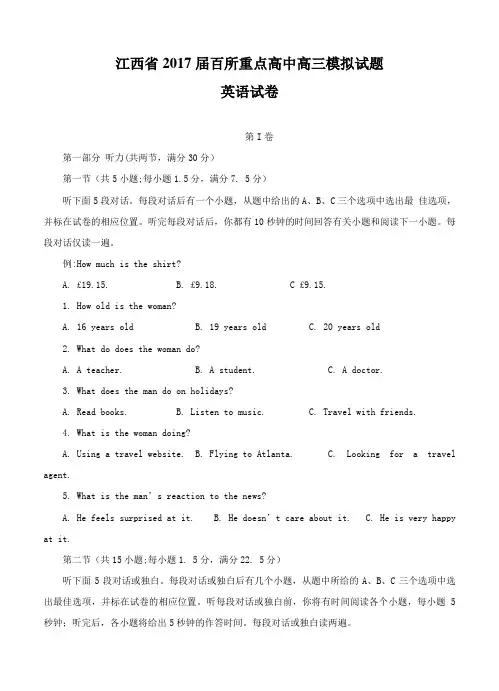
江西省2017届百所重点高中高三模拟试题英语试卷第I卷第一部分听力(共两节,满分30分)第一节(共5小题;每小题1.5分,满分7. 5分)听下面5段对话。
每段对话后有一个小题,从题中给出的A、B、C三个选项中选出最佳选项,并标在试卷的相应位置。
听完每段对话后,你都有10秒钟的时间回答有关小题和阅读下一小题。
每段对话仅读一遍。
例:How much is the shirt?A. £19.15.B. £9.18. C £9.15.1. How old is the woman?A. 16 years oldB. 19 years oldC. 20 years old2. What do does the woman do?A. A teacher.B. A student.C. A doctor.3. What does the man do on holidays?A. Read books.B. Listen to music.C. Travel with friends.4. What is the woman doing?A. Using a travel website.B. Flying to Atlanta.C. Looking for a travel agent.5. What is the man’s reaction to the news?A. He feels surprised at it.B. He doesn’t care about it.C. He is very happy at it.第二节(共15小题;每小题1. 5分,满分22. 5分)听下面5段对话或独白。
每段对话或独白后有几个小题,从题中所给的A、B、C三个选项中选出最佳选项,并标在试卷的相应位置。
听每段对话或独白前,你将有时间阅读各个小题,每小题5秒钟;听完后,各小题将给出5秒钟的作答时间。
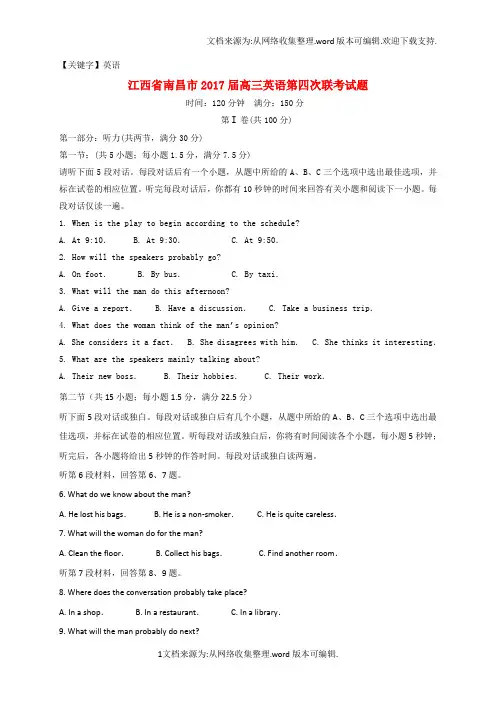
【关键字】英语江西省南昌市2017届高三英语第四次联考试题时间:120分钟满分:150分第Ⅰ卷(共100分)第一部分:听力(共两节,满分30分)第一节:(共5小题;每小题1.5分,满分7.5分)请听下面5段对话。
每段对话后有一个小题,从题中所给的A、B、C三个选项中选出最佳选项,并标在试卷的相应位置。
听完每段对话后,你都有10秒钟的时间来回答有关小题和阅读下一小题。
每段对话仅读一遍。
1. When is the play to begin according to the schedule?A. At 9:10.B. At 9:30.C. At 9:50.2. How will the speakers probably go?A. On foot.B. By bus.C. By taxi.3. What will the man do this afternoon?A. Give a report.B. Have a discussion.C. Take a business trip.4. What does the woman think of the man’s opinion?A. She considers it a fact.B. She disagrees with him.C. She thinks it interesting.5. What are the speakers mainly talking about?A. Their new boss.B. Their hobbies.C. Their work.第二节(共15小题;每小题1.5分,满分22.5分)听下面5段对话或独白。
每段对话或独白后有几个小题,从题中所给的A、B、C三个选项中选出最佳选项,并标在试卷的相应位置。
听每段对话或独白后,你将有时间阅读各个小题,每小题5秒钟;听完后,各小题将给出5秒钟的作答时间。
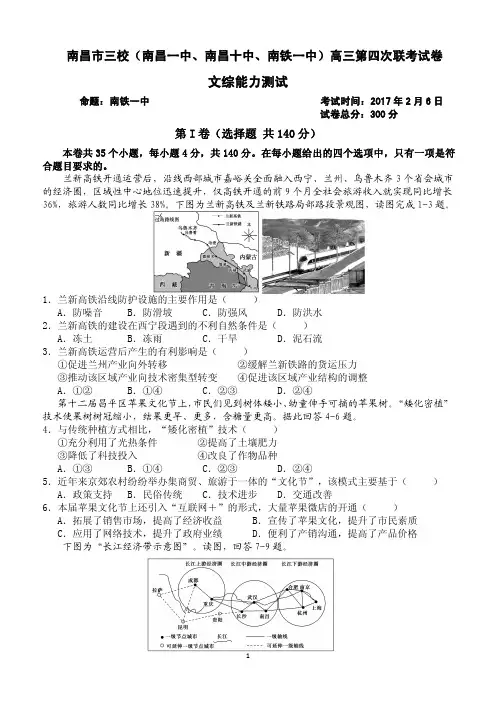
南昌市三校(南昌一中、南昌十中、南铁一中)高三第四次联考试卷文综能力测试命题:南铁一中考试时间:2017年2月6日试卷总分:300分第I卷(选择题共140分)本卷共35个小题,每小题4分,共140分。
在每小题给出的四个选项中,只有一项是符合题目要求的。
兰新高铁开通运营后,沿线西部城市嘉峪关全面融入西宁、兰州、乌鲁木齐3个省会城市的经济圈,区域性中心地位迅速提升,仅高铁开通的前9个月全社会旅游收入就实现同比增长36%,旅游人数同比增长38%。
下图为兰新高铁及兰新铁路局部路段景观图,读图完成1-3题。
1.兰新高铁沿线防护设施的主要作用是()A.防噪音B.防滑坡C.防强风D.防洪水2.兰新高铁的建设在西宁段遇到的不利自然条件是()A.冻土B.冻雨C.干旱D.泥石流3.兰新高铁运营后产生的有利影响是()①促进兰州产业向外转移②缓解兰新铁路的货运压力③推动该区域产业向技术密集型转变④促进该区域产业结构的调整A.①②B.①④C.②③D.②④第十二届昌平区苹果文化节上,市民们见到树体矮小、幼童伸手可摘的苹果树。
“矮化密植”技术使果树树冠缩小,结果更早、更多,含糖量更高。
据此回答4-6题。
4.与传统种植方式相比,“矮化密植”技术()①充分利用了光热条件②提高了土壤肥力③降低了科技投入④改良了作物品种A.①③B.①④C.②③D.②④5.近年来京郊农村纷纷举办集商贸、旅游于一体的“文化节”,该模式主要基于()A.政策支持B.民俗传统C.技术进步D.交通改善6.本届苹果文化节上还引入“互联网+”的形式,大量苹果微店的开通()A.拓展了销售市场,提高了经济收益B.宣传了苹果文化,提升了市民素质C.应用了网络技术,提升了政府业绩D.便利了产销沟通,提高了产品价格下图为“长江经济带示意图”。
读图,回答7-9题。
7.长江流域应()A.在上游区大力提高航运能力B.在下游区进行水能梯级开发C.注重保护调水工程的水源地D.扩大全流域水库的防洪库容8.长江下游经济圈较上游经济圈()①工农业基础好②水能资源丰富③矿产资源丰富④经济腹地广大⑤交通便利A.①②③B.①④⑤C.①②⑤D.③④⑤9.图中城市()A.重庆和杭州的城市等级相同B.武汉比昆明提供的服务种类多C.成都和拉萨的城市规模相同D.上海市服务功能强,辐射全国南非是非洲经济最发达的国家,是我国在该大洲的最大贸易国。
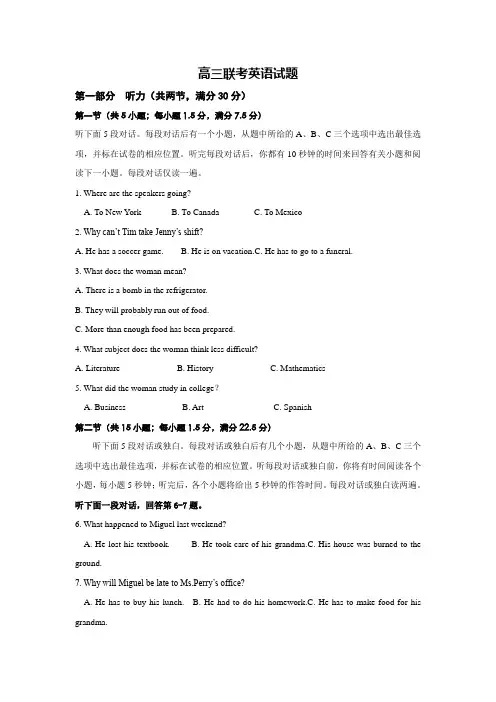
高三联考英语试题第一部分听力(共两节,满分30分)第一节(共5小题;每小题1.5分,满分7.5分)听下面5段对话。
每段对话后有一个小题,从题中所给的A、B、C三个选项中选出最佳选项,并标在试卷的相应位置。
听完每段对话后,你都有10秒钟的时间来回答有关小题和阅读下一小题。
每段对话仅读一遍。
1. Where are the speakers going?A. To New YorkB. To CanadaC. To Mexico2. Why can’t Tim take Jenny’s shift?A. He has a soccer game.B. He is on vacation.C. He has to go to a funeral.3. What does the woman mean?A. There is a bomb in the refrigerator.B. They will probably run out of food.C. More than enough food has been prepared.4. What subject does the woman think less difficult?A. LiteratureB. HistoryC. Mathematics5. What did the woman study in college?A. BusinessB. ArtC. Spanish第二节(共15小题;每小题1.5分,满分22.5分)听下面5段对话或独白。
每段对话或独白后有几个小题,从题中所给的A、B、C三个选项中选出最佳选项,并标在试卷的相应位置。
听每段对话或独白前,你将有时间阅读各个小题,每小题5秒钟;听完后,各个小题将给出5秒钟的作答时间。
每段对话或独白读两遍。
听下面一段对话,回答第6-7题。
6. What happened to Miguel last weekend?A. He lost his textbook.B. He took care of his grandma.C. His house was burned to the ground.7. Why will Miguel be late to Ms.Perry’s office?A. He has to buy his lunch.B. He had to do his homework.C. He has to make food for his grandma.听下面一段对话,回答第8-10 题。
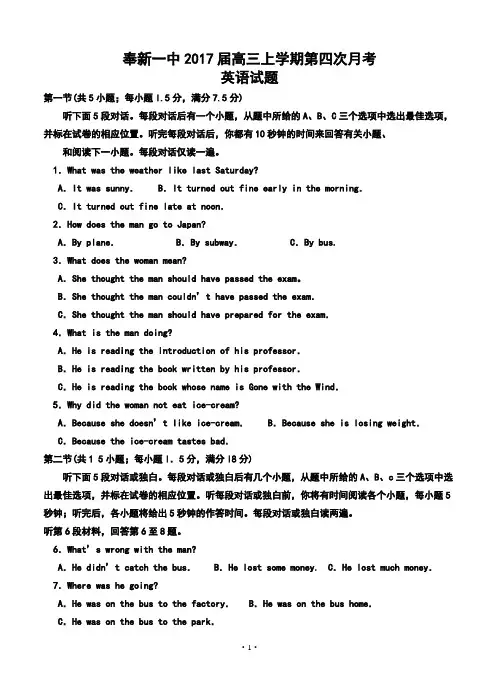
奉新一中2017届高三上学期第四次月考英语试题第一节(共5小题;每小题l.5分,满分7.5分)听下面5段对话。
每段对话后有一个小题,从题中所给的A、B、C三个选项中选出最佳选项,并标在试卷的相应位置。
听完每段对话后,你都有10秒钟的时间来回答有关小题、和阅读下一小题。
每段对话仅读一遍。
1.What was the weather like last Saturday?A.It was sunny. B.It turned out fine early in the morning.C.It turned out fine late at noon.2.How does the man go to Japan?A.By plane.B.By subway.C.By bus.3.What does the woman mean?A.She thought the man should have passed the exam。
B.She thought the man couldn’t have passed the exam.C.She thought the man should have prepared for the exam.4.What is the man doing?A.He is reading the introduction of his professor.B.He is reading the book written by his professor.C.He is reading the book whose name is Gone with the Wind.5.Why did the woman not eat ice-cream?A.Because she doesn’t like ice-cream. B.Because she is losing weight.C.Because the ice-cream tastes bad.第二节(共1 5小题;每小题l.5分,满分l8分)听下面5段对话或独白。
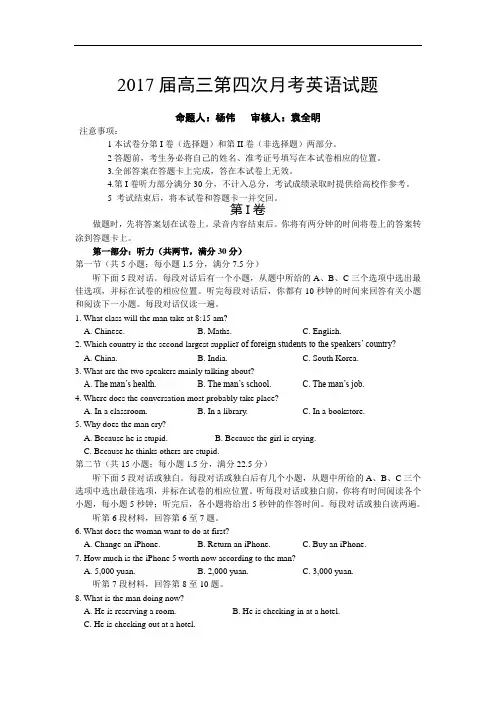
2017届高三第四次月考英语试题命题人:杨伟审核人:袁全明注意事项:1本试卷分第I卷(选择题)和第II卷(非选择题)两部分。
2答题前,考生务必将自己的姓名、准考证号填写在本试卷相应的位置。
3.全部答案在答题卡上完成,答在本试卷上无效。
4.第I卷听力部分满分30分,不计入总分,考试成绩录取时提供给高校作参考。
5 考试结束后,将本试卷和答题卡一并交回。
第I卷做题时,先将答案划在试卷上。
录音内容结束后。
你将有两分钟的时间将卷上的答案转涂到答题卡上。
第一部分:听力(共两节,满分30分)第一节(共5小题;每小题1.5分,满分7.5分)听下面5段对话。
每段对话后有一个小题,从题中所给的A、B、C三个选项中选出最佳选项,并标在试卷的相应位置。
听完每段对话后,你都有10秒钟的时间来回答有关小题和阅读下一小题。
每段对话仅读一遍。
1. What class will the man take at 8:15 am?A. Chinese.B. Maths.C. English.2. Which country is the second largest supplie r of foreign students to the speakers’ country?A. China.B. India.C. South Korea.3. What are the two speakers mainly talking about?A. The man’s health.B. The man’s school.C. The man’s job.4. Where does the conversation most probably take place?A. In a classroom.B. In a library.C. In a bookstore.5. Why does the man cry?A. Because he is stupid.B. Because the girl is crying.C. Because he thinks others are stupid.第二节(共15小题;每小题1.5分,满分22.5分)听下面5段对话或独白。
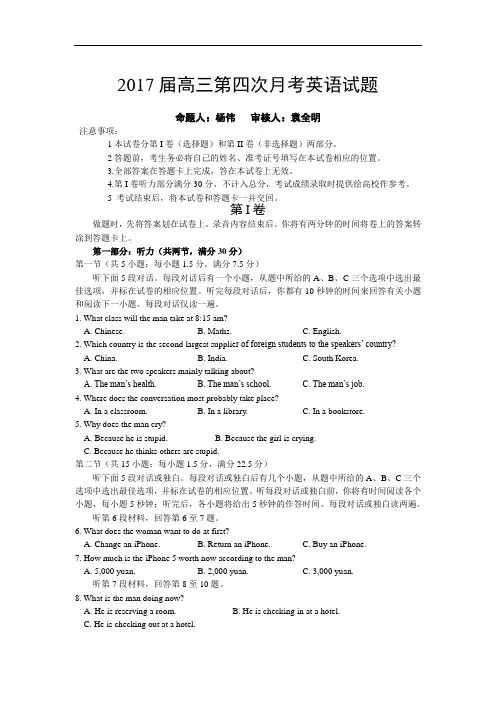
2017届高三第四次月考英语试题命题人:杨伟审核人:袁全明注意事项:1本试卷分第I卷(选择题)和第II卷(非选择题)两部分。
2答题前,考生务必将自己的姓名、准考证号填写在本试卷相应的位置。
3.全部答案在答题卡上完成,答在本试卷上无效。
4.第I卷听力部分满分30分,不计入总分,考试成绩录取时提供给高校作参考。
5 考试结束后,将本试卷和答题卡一并交回。
第I卷做题时,先将答案划在试卷上。
录音内容结束后。
你将有两分钟的时间将卷上的答案转涂到答题卡上。
第一部分:听力(共两节,满分30分)第一节(共5小题;每小题1.5分,满分7.5分)听下面5段对话。
每段对话后有一个小题,从题中所给的A、B、C三个选项中选出最佳选项,并标在试卷的相应位置。
听完每段对话后,你都有10秒钟的时间来回答有关小题和阅读下一小题。
每段对话仅读一遍。
1. What class will the man take at 8:15 am?A. Chinese.B. Maths.C. English.2. Which country is the second largest supplie r of foreign students to the speakers’ country?A. China.B. India.C. South Korea.3. What are the two speakers mainly talking about?A. The man’s health.B. The man’s school.C. The man’s job.4. Where does the conversation most probably take place?A. In a classroom.B. In a library.C. In a bookstore.5. Why does the man cry?A. Because he is stupid.B. Because the girl is crying.C. Because he thinks others are stupid.第二节(共15小题;每小题1.5分,满分22.5分)听下面5段对话或独白。
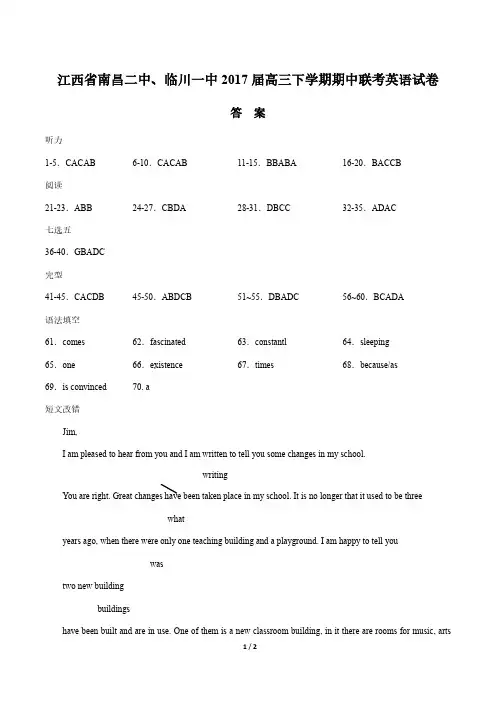
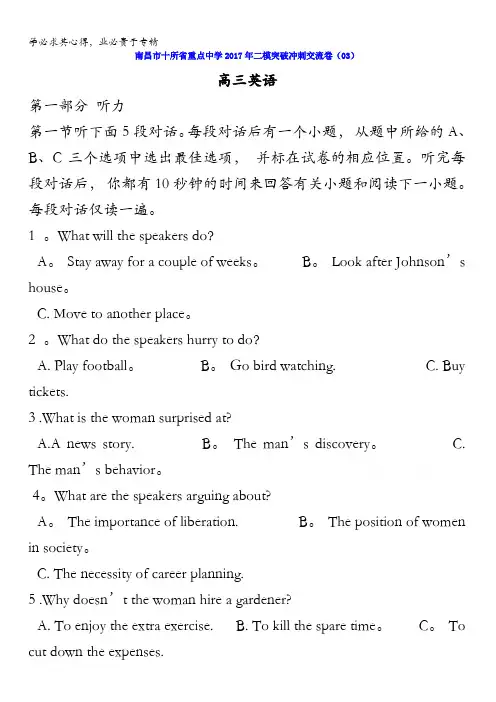
南昌市十所省重点中学2017年二模突破冲刺交流卷(03)高三英语第一部分听力第一节听下面5段对话。
每段对话后有一个小题,从题中所给的A、B、C三个选项中选出最佳选项,并标在试卷的相应位置。
听完每段对话后,你都有10秒钟的时间来回答有关小题和阅读下一小题。
每段对话仅读一遍。
1 。
What will the speakers do?A。
Stay away for a couple of weeks。
B。
Look after Johnson’s house。
C. Move to another place。
2 。
What do the speakers hurry to do?A. Play football。
B。
Go bird watching. C. Buy tickets.3 .What is the woman surprised at?A.A news story. B。
The man’s discovery。
C. The man’s behavior。
4。
What are the speakers arguing about?A。
The importance of liberation. B。
The position of women in society。
C. The necessity of career planning.5 .Why doesn’t the woman hire a gardener?A. To enjoy the extra exercise.B. To kill the spare time。
C。
To cut down the expenses.第二节听下面5段对话或独白。
每段对话或独白后有几个小题,从题中所给的A、B、C三个选项中选出最佳选项,并标在试卷的相应位置。
听每段对话或独白前,你将有时间阅读各个小题,每小题5秒钟;听完后,各小题将给出5秒钟的作答时间。
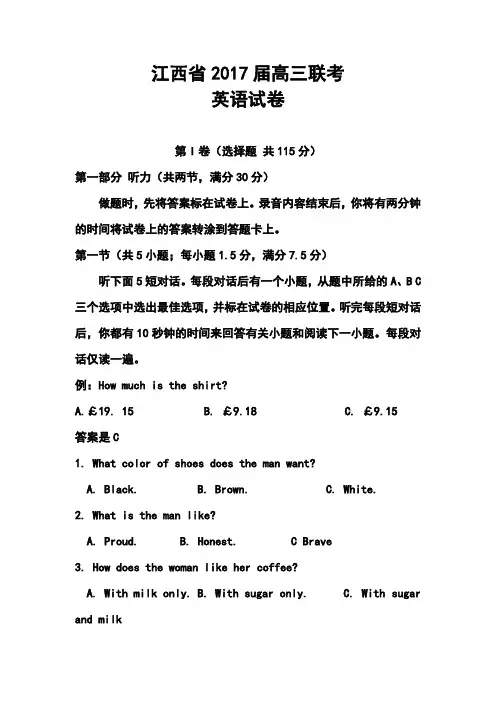
江西省2017届高三联考英语试卷第I卷(选择题共115分)第一部分听力(共两节,满分30分)做题时,先将答案标在试卷上。
录音内容结束后,你将有两分钟的时间将试卷上的答案转涂到答题卡上。
第一节(共5小题;每小题1.5分,满分7.5分)听下面5短对话。
每段对话后有一个小题,从题中所给的A、B C 三个选项中选出最佳选项,并标在试卷的相应位置。
听完每段短对话后,你都有10秒钟的时间来回答有关小题和阅读下一小题。
每段对话仅读一遍。
例:How much is the shirt?A.£19. 15B. £9.18C. £9.15 答案是C1. What color of shoes does the man want?A. Black.B. Brown.C. White.2. What is the man like?A. Proud.B. Honest. C Brave3. How does the woman like her coffee?A. With milk only.B. With sugar only.C. With sugar and milk4. What are the two speakers talking about?A. A basketball player.B. A basketball teamC. A basketball match5. When will the next bus leave?A. At 9:30.B. At 9:35.C. At 10:00.第二节(共15小题;每小题1.5分,满分22.5分)听下面5段对话或独白。
每段对话或独白后有几个小题。
从题中所给的A、B、C三个选项中选出最佳选项。
并标在试卷的相应位置。
听每段对话或独白前,你将有时间阅读各小题,每小题5秒钟;听完后,各小题将给出5秒钟的作答时间,每段对话或独白读两遍。
听第6段材料,回答6、7题。
江西省六校2017届高三英语联考试卷(无答案)考试时长:120分钟总分:150分第Ⅰ 卷(选择题满分100分)第一部分:听力(共两节;满分30分)做题时,先将答案标在试卷上。
录音内容结束后,你将有两分钟的时间将试卷上的答案转涂到答题卡上。
第一节:(共5小题;每小题1.5分,满分7.5分)听下面5段对话。
每段对话后有一个小题,从题中所给的A、B、C三个选项中选出最佳选项,并标在试卷的相应位置。
听完每段对话后,你都有10秒钟的时间来回答有关小题和阅读下一小题。
每段对话仅读一遍。
1. What will the man probably do next?A. Put on a shirt.B. Turn the dryer off.C. Fix the refrigerator.2. What did the man do today?A. He ate some pie.B. He went to the bakery.C. He forgot to bring dessert.3. What is the woman probably doing?A. Drinking water.B. Learning to swim.C. Performing a long jump.4. Where are the speakers?A. At a hotel.B. At a classroom.C. At a gym.5. What is the girl’s name?A. Sarah.B. Maria.C. Elizabeth.第二节(共15小题;每小题1.5分,满分22.5分)听下面5段对话或独白。
每段对话或独白后有几个小题,从题中所给的A、B、C三个选项中选出最佳选项,并标在试卷的相应位置。
听每段对话或独白前,你将有时间阅读各个小题,每小题5秒钟;听完后,各小题将给出5秒钟的作答时间。
每段对话或独白读两遍。
南昌市三校(南昌一中、南昌十中、南铁一中)高三第三次联考试卷英语考试时间:120分钟试卷总分:150分第I卷(共三部分,满分100分)第一部分听力(共两节,满分30分)第一节(共5小题;每小题1.5分,满分7.5分)听下面5段对话。
每段对话后有一个小题,从题中所给的A、B、C三个选项中选出最佳选项,并标在试卷的相应位置。
听完每段对话后,你都有10秒钟的时间来回答有关小题和阅读下一小题,每段对话仅读一遍。
1. What was the last place the man visited?A. RomeB. ThailandC. China.2. Why doesn’t the woman advise the man to go to the store around the corner ?A. The clothes there are not good.B. The clothes there are all skirts.C. The clothes there are expensive.3. What’s the probable relationship between the two speakers ?A. Boss and secretary.B. Brother and sister.C. Teacher and student.4.What did the man plan to do at first?A. Visit Professor Brown.B. Watch a movie.C. Attend a class.5.What are the two speakers mainly talking about?A. A birthday party.B. A wedding ceremony.C. An anniversary celebration. 第二节(共15小题;每小题1.5分,满分22.5分)听下面5段对话或独白。
南昌二中、临川一中2017届高三联考英语试题第一部分听力(共两节,满分30分)第一节(共5小题;每小题1.5分,满分7.5分)听下面5段对话。
每段对话后有一个小题,从题中所给的A、B、C三个选项中选出最佳选项,并标在试卷的相应位置。
听完每段对话后,你都有10秒钟的时间来回答有关小题和阅读下一小题。
每段对话仅读一遍。
1. Where are the speakers going?A. To New YorkB. To CanadaC. To Mexico2. Why can’t Tim take Jenny’s shift?A. He has a soccer game.B. He is on vacation.C. He has to go to a funeral.3. What does the woman mean?A. There is a bomb in the refrigerator.B. They will probably run out of food.C. More than enough food has been prepared.4. What subject does the woman think less difficult?A. LiteratureB. HistoryC. Mathematics5. What did the woman study in college?A. BusinessB. ArtC. Spanish第二节(共15小题;每小题1.5分,满分22.5分)听下面5段对话或独白。
每段对话或独白后有几个小题,从题中所给的A、B、C三个选项中选出最佳选项,并标在试卷的相应位置。
听每段对话或独白前,你将有时间阅读各个小题,每小题5秒钟;听完后,各个小题将给出5秒钟的作答时间。
每段对话或独白读两遍。
听下面一段对话,回答第6-7题。
6. What happened to Miguel last weekend?A. He lost his textbook.B. He took care of his grandma.C. His house was burned to the ground.7. Why will Miguel be late to Ms.Perry’s office?A. He has to buy his lunch.B. He had to do his homework.C. He has to make food for his grandma. 听下面一段对话,回答第8-10 题。
江西省南昌市2017届高三英语第四次联考试题 时间:120分钟 满分:150分 第Ⅰ卷(共100分) 第一部分:听力(共两节,满分30分) 第一节:(共5小题;每小题1.5分,满分7.5分) 请听下面5段对话。每段对话后有一个小题,从题中所给的A、B、C三个选项中选出最佳选项,并标在试卷的相应位置。听完每段对话后,你都有10秒钟的时间来回答有关小题和阅读下一小题。每段对话仅读一遍。 1. When is the play to begin according to the schedule? A. At 9:10. B. At 9:30. C. At 9:50. 2. How will the speakers probably go? A. On foot. B. By bus. C. By taxi. 3. What will the man do this afternoon? A. Give a report. B. Have a discussion. C. Take a business trip. 4. What does the woman think of the man’s opinion? A. She considers it a fact. B. She disagrees with him. C. She thinks it interesting. 5. What are the speakers mainly talking about? A. Their new boss. B. Their hobbies. C. Their work.
第二节(共15小题;每小题1.5分,满分22.5分) 听下面5段对话或独白。每段对话或独白后有几个小题,从题中所给的A、B、C三个选项中选出最佳选项,并标在试卷的相应位置。听每段对话或独白后,你将有时间阅读各个小题,每小题5秒钟;听完后,各小题将给出5秒钟的作答时间。每段对话或独白读两遍。 听第6段材料,回答第6、7题。 6. What do we know about the man? A. He lost his bags. B. He is a non-smoker. C. He is quite careless. 7. What will the woman do for the man? A. Clean the floor. B. Collect his bags. C. Find another room. 听第7段材料,回答第8、9题。 8. Where does the conversation probably take place? A. In a shop. B. In a restaurant. C. In a library. 9. What will the man probably do next? A. Observe the customer. B. Find a security guard. C. Do some shopping. 听第8段材料,回答第10至12题。 10. What is the probable relationship between the speakers? A. Former colleagues. B. Teacher and student. C. Old classmates. 11. When did the speakers last see each other? A. Two weeks ago. B. Four years ago. C. Ten years ago. 12. Which is one of the woman’s favorite memories? A. Listening to a professor. B. Giving a presentation. C. Attending a party. 听第9段材料,回答第13至16题。 13. What did Mrs. Lewis think of the course? A. It was well organized. B. It cost too much. C. It made her annoyed. 14. Why did the man ask for a day off? A. To go on vacation. B. To look after his son. C. To find another trainer. 15. What happened to the replacement trainer? A. He came late to class. B. He wasn’t well prepared. C. He ended the class earlier. 16. Who is to blame according to the speakers? A. Mrs. Lewis’ company. B. The woman speaker. C. The man himself. 听第10段材料,回答第17至20题。 17. When did people begin to live in Coober Pedy? A. In 1915. B. In 1920. C. In 1930. 18. What attracted people to Coober Pedy at first? A. Its extreme climate. B. Its surroundings. C. Its precious stones. 19. Who created the first settlements in Coober Pedy? A. Some Europeans. B. Australian soldiers. C. French explorers. 20. How did people survive in the tough conditions? A. By living underground. B. By building large houses. C. By developing tourism. 第二部分:阅读理解(共两节,40分)
第一节:(共15小题,每小题2分,满分30分) 阅读下列短文,从每题所给的四个选项(A、B、C和D)中,选出最佳选项。 A We’ve been running for three days. Appointments, evening activities and athletic events. Now we’ve just returned from a field trip and there’s cooking to do for an event tonight. I put on one of my husband’s T-shirts and a pair of sweatpants and start to work. I decide to ignore the table littered with books and coffee cups, the dishes that need washing and the floor that needs good cleaning. I’ll deal with the whole mess when I finish the cooking. Suddenly I hear a knock at the door. “Hello,” calls a sunny voice. I look through the window and a beautiful friend waves her hand out there. She’s dressed from work and looks completely together (井井有条的), too together for this kind of mess. But she comes in. I cringe (畏缩) for the condition of my home, for the way I look and for the vulnerability of being a straight-up mess. But to my surprise, my friend gives me a hug. And as I tidy the messy house, my friend and I chat freely and happily. As we chat, I find that I’m anything but ashamed. Suddenly I realize that she’s looking at my heart, not my house. I can be real-life vulnerable with this friend because the friendship is true, and true friendships are not woven with judgment and criticism but with love. Standing there, relaxed and warmed from the inside, I’m thankful that I’m enjoying safe vulnerability, and that regardless of my mess, I am loved by my friend. 21. What’s the recent situation of the author? A. Being ill. B. Being busy. C. Planning for a trip. D. Just having moved into a new house. 22. What’s the author about to do when her friend comes? A. To go to work. B. To read a book for relaxation. C. To do some washing and cleaning. D. To prepare food for an evening event. 23. What can we learn about the author’s friend? A. She comes only to be shocked at the messy house. B. She comes well-dressed and behaves very well. C. She comes to the author’s help. D. She comes for an appointment with the author.